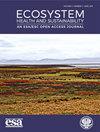生态脆弱性及其转化机制的新视角
IF 3.4
2区 环境科学与生态学
Q1 ECOLOGY
引用次数: 3
摘要
生态脆弱性是指生态系统受到干扰的程度、系统受到破坏的程度以及系统恢复的能力。尽管对生态脆弱性的个案评估进展迅速,但这些评估主要在人类活动密集的地区或恶劣的自然环境中进行。本文利用Web of ScienceTM核心集合,总结了2000年至2022年发表的生态脆弱性研究,并深入分析了主要案例研究。研究发现,传统的生态脆弱性研究主要在评估模型、数据处理模型和影响因素分析方面进行,但缺乏对脆弱性转化过程的研究。由于分级脆弱性指标体系中的脆弱性转换是由异质区域中的多个因素调节的,因此迫切需要了解一个区域的生态脆弱性是如何随着时间的推移从一个级别演变到另一个级别的。因此,本文提出了一种新的研究视角,即应用定量分析方法识别调节因素,探索生态脆弱性转化机制。这一新视角有助于监测生态脆弱性的复杂时空变化,并采取必要措施防止生态稳定性下降。图形摘要本文章由计算机程序翻译,如有差异,请以英文原文为准。
A new perspective on ecological vulnerability and its transformation mechanisms
ABSTRACT Ecological vulnerability refers to the degree of ecosystem disturbance, system damage, and the ability of system restoration. Although case-specific evaluations of ecological vulnerability are progressing rapidly, they have been carried out mainly in areas with intensive human activities or in harsh natural environments. Using the Web of ScienceTM core collection, this review paper summarized studies on ecological vulnerability published from 2000 to 2022 and analyzed in depth major case studies. It was found that traditional ecological vulnerability research has been addressed largely in terms of assessment models, data processing models, and analysis of influencing factors, however there was a lack of research on the process of vulnerability transformation. Because the vulnerability transformation in a hierarchical vulnerability index system is regulated by multiple factors in a heterogeneous region, it is urgent to understand how the ecological vulnerability in a region evolves from one level to another over time. Therefore this paper put forward the new perspective of research, i.e., applying quantitative analysis to identification of regulating factors and exploring the mechanisms of ecological vulnerability transformation. This new perspective could assist in monitoring the complex spatiotemporal changes in ecological vulnerability and taking necessary measures to prevent from decline of ecological stability. Graphical abstract
求助全文
通过发布文献求助,成功后即可免费获取论文全文。
去求助
来源期刊

Ecosystem Health and Sustainability
Environmental Science-Management, Monitoring, Policy and Law
CiteScore
7.10
自引率
2.00%
发文量
40
审稿时长
22 weeks
期刊介绍:
Ecosystem Health and Sustainability publishes articles on advances in ecology and sustainability science, how global environmental change affects ecosystem health, how changes in human activities affect ecosystem conditions, and system-based approaches for applying ecological science in decision-making to promote sustainable development. Papers focus on applying ecological theory, principles, and concepts to support sustainable development, especially in regions undergoing rapid environmental change. Papers on multi-scale, integrative, and interdisciplinary studies, and on international collaborations between scientists from industrialized and industrializing countries are especially welcome.
Suitable topics for EHS include:
• Global, regional and local studies of international significance
• Impact of global or regional environmental change on natural ecosystems
• Interdisciplinary research involving integration of natural, social, and behavioral sciences
• Science and policy that promote the use of ecological sciences in decision making
• Novel or multidisciplinary approaches for solving complex ecological problems
• Multi-scale and long-term observations of ecosystem evolution
• Development of novel systems approaches or modeling and simulation techniques
• Rapid responses to emerging ecological issues.
 求助内容:
求助内容: 应助结果提醒方式:
应助结果提醒方式:


